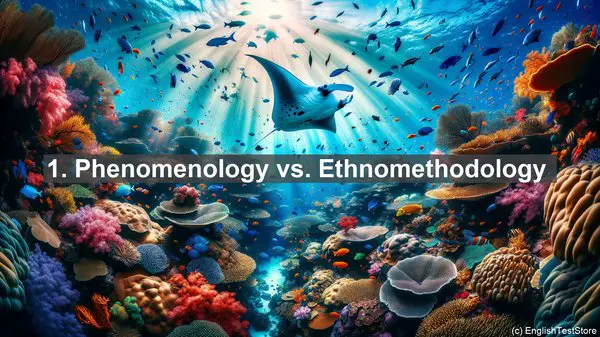Introduction to Ethnomethodology
Before diving into the confusing words, let’s have a quick overview of Ethnomethodology. It is a branch of sociology that focuses on the everyday methods and practices people use to make sense of the social world.
1. Phenomenology vs. Ethnomethodology
Phenomenology deals with individual experiences, while Ethnomethodology focuses on the social aspects of those experiences. So, while they’re related, they have distinct emphases.
2. Conversation Analysis vs. Ethnomethodology
Conversation Analysis is a method used within Ethnomethodology. It examines the structure and organization of conversations to understand how meaning is created.

3. Indexicality vs. Reflexivity
Indexicality refers to how meaning is context-dependent, while reflexivity is about individuals’ awareness of their own actions and the impact on the social context.
4. Membership Categorization vs. Ethnomethodology
Membership Categorization Analysis is a specific approach within Ethnomethodology. It explores how people use categories to make sense of social interactions.

5. Accountability vs. Reflexivity
Accountability is the idea that individuals are answerable for their actions, while reflexivity is about individuals reflecting on their actions and their consequences.
6. Ethnomethodology vs. Symbolic Interactionism
Both Ethnomethodology and Symbolic Interactionism are concerned with the social construction of reality. However, Ethnomethodology focuses more on the methods and practices people use to create that reality.
7. Ethnomethodology vs. Ethnography
Ethnomethodology is a theoretical perspective, while Ethnography is a research method. Ethnomethodology can be used within the broader framework of Ethnography.
8. Practical Action vs. Ethnomethodology
Practical Action refers to the everyday actions people take, while Ethnomethodology is interested in the methods and practices behind those actions.
9. Ethnomethodology vs. Microsociology
Ethnomethodology is often considered a part of Microsociology, which focuses on the small-scale interactions and their significance in the larger social context.
10. Ethnomethodology vs. Phenomenography
Phenomenography is the study of how individuals experience and understand phenomena, while Ethnomethodology is more concerned with the social aspects of those experiences.
